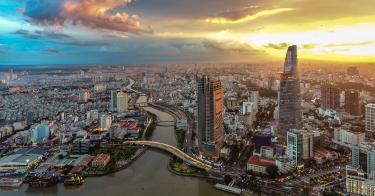It’s been almost half a century since the end of the Vietnam War, and the relationship between the United States and Vietnam, particularly in terms of trade and investment, has been steadily improving since the normalization of relations in 1995.
According to a 2021 report by the Congressional Research Service, bilateral trade between the two countries reached $90 billion in 2020, an increase of 17% from the previous year.
The United States is Vietnam’s second-largest trading partner, while Vietnam is the United States’ 10th-largest. And unlike the European Union-China partnership agreement—consideration of which has been “frozen” by the EU Parliament—the U.S.-Vietnam relationship is built on something much stronger; namely, an understanding of the principles of economic freedom.
Vietnam has shown steady growth in both economic output and freedom in its transition to a more free-market economic system. Despite projections of economic downturn as a result of the coronavirus pandemic, Vietnam actually was the highest performing Asian economy in 2020, outpacing China with an estimated growth rate of 2.9%.
>>> As Growing Trade Partner, Vietnam Improves Economic Freedom
Much of this growth is credited to Vietnam’s booming manufacturing industry and the high international demand for Vietnamese exported goods. At the same time, Vietnam has been continuing to open its economy up to international trade and participating in bilateral and multilateral agreements with the rest of the world.
In 2019, Vietnam joined the Comprehensive and Progressive Agreement for Trans-Pacific Partnership, a free trade agreement among 11 countries in Asia, the Pacific, and North America, and signed its own bilateral trade agreement with the European Union.
And in 2020, Vietnam became a founding member of the Regional Comprehensive Economic Partnership, a massive trade agreement joining together the 10 Association of Southeast Asian Nations countries, along with Australia, China, India, Japan, New Zealand, and South Korea, into the world’s largest trading bloc. It encompasses over a quarter of the world’s gross domestic product and half of the world’s population.
These recent actions have been noticed and recognized in Vietnam’s steady improvements in its ranking in The Heritage Foundation’s Index of Economic Freedom. In the 2021 index, Vietnam jumped 15 places to become the 90th-freest economy in the world out of 178 countries ranked, and the 17th-freest in the Asia-Pacific.
However, the country is still only considered moderately free due to lingering institutional weaknesses, such as persistent corruption and the lack of judicial independence, that are holding back its economic freedom.
Still, Vietnam’s efforts toward achieving more economic liberalization are certainly commendable, especially given the current trajectory of similarly positioned countries in the region.
The country’s ongoing reforms in key pillars of economic freedom have led to measurable progress in ensuring private property rights and market openness.
In the 27 years of the index’s publication, Vietnam has seen greater improvements in its score than other nations, such as Russia or China, especially in the categories of investment and financial freedom.
>>> 2021 Index of Economic Freedom
As Vietnam continues its embrace of more free-market principles, it should be regarded as an increasingly important strategic economic partner of the United States.
Economic relationships in the Indo-Pacific region are changing fast, and the United States needs to make sure that it continues to actively cultivate closer relations with like-minded regional powers, even as those powers are cultivating closer relations among themselves and with China.
This piece originally appeared in The Daily Signal.




